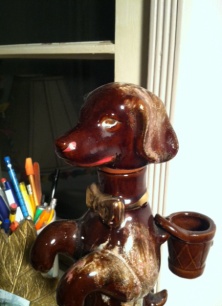The Hideous Dachshund
Posted by donraymedia on March 28, 2014
Oral histories provide not only details, but emotions that remain with people the rest of their lives. This beautifully written, from-the-heart blog entry that my friend Fran Tunno wrote drives this message home. It’s some of the best writing I’ve ever encountered. I hope you’ll enjoy it.
 I have now been in this apartment for about 29 days. It’s hard to remember exact numbers because I was between bouts of near-vomiting when I moved, but that’s pretty close. Yet, I am still not completely unpacked and my bedroom looks like it belongs to someone on “Hoarders.” Does it bother me? No, because a hideous dachshund taught me a valuable lesson in my younger days that I’ve not forgotten. Of course, this story involves my mother.
I have now been in this apartment for about 29 days. It’s hard to remember exact numbers because I was between bouts of near-vomiting when I moved, but that’s pretty close. Yet, I am still not completely unpacked and my bedroom looks like it belongs to someone on “Hoarders.” Does it bother me? No, because a hideous dachshund taught me a valuable lesson in my younger days that I’ve not forgotten. Of course, this story involves my mother.
Although my mom embarrassed me daily during my childhood with things like girdle displays, dandelion picking and her Italian accent (to name a few) we almost never fought. I was more a mediator, like my dad. Actually, my father was a mediator poised for sainthood. His interactions with my mother left him at a level of martyrdom I couldn’t begin to approach. But I learned to hide my eye-rolling and imitations of…
View original post 1,336 more words
Mary said
Well done Fran!! Love it!